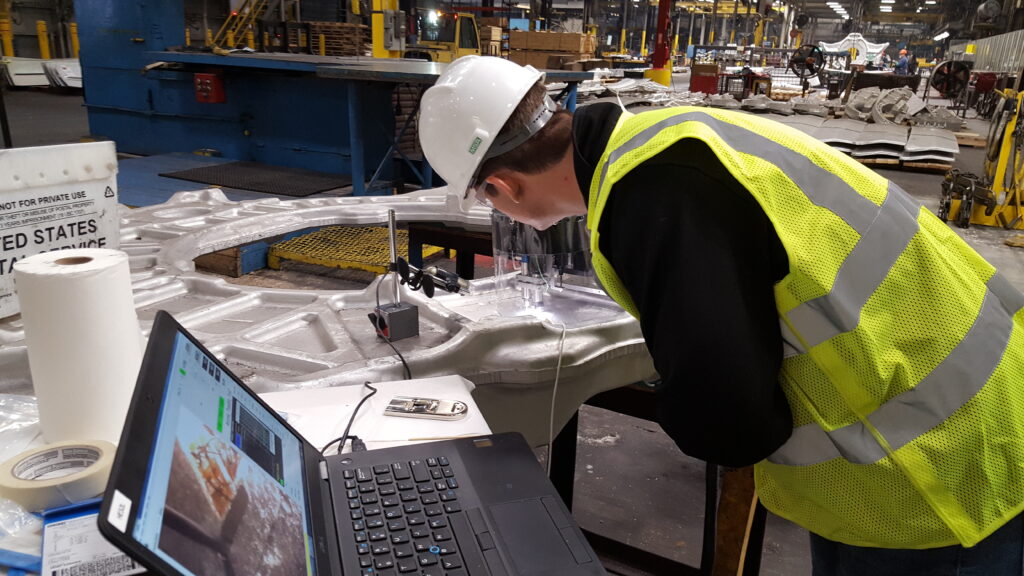Hill Engineering has published a comprehensive case study evaluating the repeatability of contour method residual stress measurements across a variety of materials, processes, and geometries. This study provides valuable insights into the precision of the contour method, reinforcing its reliability for residual stress analysis.
Tag: Residual Stress Measurement
Search results for Hill Engineering blog posts containing the tag residual stress measurement
Hill Engineering Reinforces Commitment to Excellence with ISO Accreditation Renewal
Delivering high quality residual stress measurement results to our customers is a top priority for Hill Engineering, and one way we ensure that is by maintaining an active ISO/IEC 17025 accreditation. We recently went through an external assessment to renew our accreditation status that looked at the inner workings of our quality management system and laboratory processes.
Continue reading Hill Engineering Reinforces Commitment to Excellence with ISO Accreditation Renewal
Near Edge Residual Stress Measurement Using Incremental Hole Drilling
Background
Hole drilling is a measurement technique used to determine near surface residual stresses and has been codified in ASTM E837-20. In ASTM E837-20, the minimum allowable distance to a free edge is prescribed as 1.5 times the gauge circle diameter.
Objective
This work examines the effect arising from the distance from a free edge on a hole drilling measurement and provides an approach to determine residual stress for measurements where the edge distance is closer than that currently permitted by ASTM E837-20.
Methods
Results
Introducing Hill Engineering’s New Brochure on Deep-Hole Drilling Residual Stress Measurement
Our latest brochure highlights the Deep-Hole Drilling (DHD) residual stress measurement method, a specialized technique with applications across multiple industries, including aerospace, automotive, and heavy manufacturing.
Download Hill Engineering’s X-Ray Diffraction Residual Stress Measurement Brochure
We are excited to introduce our new downloadable brochure, providing comprehensive details on the x-ray diffraction (XRD) residual stress measurement method. Available on the X-ray Diffraction Method page, this essential technique is ideal for accurately determining near-surface residual stresses, offering precise results that are crucial for industries ranging from aerospace to manufacturing.
Continue reading Download Hill Engineering’s X-Ray Diffraction Residual Stress Measurement Brochure
A closer look at Hill Engineering’s internal audit program
In an early blog post, we discussed Hill Engineering’s efforts to build and maintain a Quality System that is compliant with ISO 17025. More recently, we touched on our quality control program, which we use as an important check to make sure that our measurements are being carried out according to established procedures and meeting certain quality requirements. Now we’re back to give another glimpse into our Quality System and talk about another important aspect, our internal audit program.
Continue reading A closer look at Hill Engineering’s internal audit program
Hill Engineering is attending IMTS 2024
Members of Hill Engineering will be attending IMTS 2024 in Chicago, IL, from September 9th through September 14th. The International Manufacturing Technology Show is a great opportunity for people in industry to connect and gain insight into the various technologies in advanced and traditional manufacturing, robotics, automation, and digital transformation, sparking inspiration and possibly finding solutions to engineering problems they are looking to solve.
Hill Engineering acquires a new XRD system
Hill Engineering has recently acquired a new diffractometer and enclosure that will enable us to perform x-ray diffraction (XRD) residual stress measurements in our Rancho Cordova, California, laboratory.
Continue reading Hill Engineering acquires a new XRD system
New case study: Residual Stress Field Team
We invite you to read our latest case study which highlights the capabilities of our Residual Stress Field Team, who can perform many of our world-class residual stress measurements on-site at a customer’s facility. Continue reading New case study: Residual Stress Field Team
Residual Stress Field Team
Hill Engineering is committed to providing high-quality residual stress measurement data to its customers, both in our laboratory and on-site. Our Residual Stress Field Team is equipped with the same knowledge and expertise as our laboratory team to meet the challenge of performing residual stress measurements in the field.
Our Residual Stress Field Team has the experience necessary to tailor each measurement approach to meet the unique needs of the customer and bring our world-class residual stress measurement capabilities to the place it matters most – the operational environment. Challenging measurement access, complex geometry, and applications requiring rapid turn time are just a few situations where our team and equipment excel, allowing us to assess both near-surface and bulk residual stress in components that are delicate, large, or otherwise unable to be sent to our laboratory for in-house testing.

From a quality control perspective, measurements performed in the field allow customers to get a detailed glimpse of their manufacturing process, as measurements can be carried out shortly before or after a critical step, such as heat treatment, all without having the component leaving the manufacturing line, saving time for the customer.
On-site measurements and services that are available through our field team include:
The Hill Engineering Residual Stress Field Team, with its ability to perform on-site residual stress measurements, is just one of the ways we offer flexible, precise, and high-quality residual stress testing to our customers. Their mobility, coupled with advanced technology, ensures that the science of engineering is not confined to laboratories but can thrive in real-world environments where innovation truly takes flight.
If you have any questions about the capabilities of our Residual Stress Field Team and how it can help your project, please contact us.